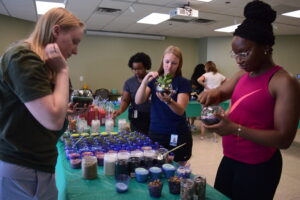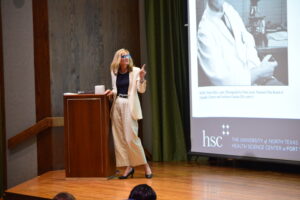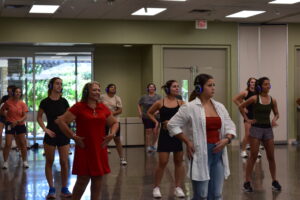2023 wellness symposium: “Whole Health for Self-Wealth”
- August 9, 2023
- By: Leslie Reyna
- Community
 The University of North Texas Health Science Center at Fort Worth’s SaferCare Texas and the School of Health Professions recently hosted a wellness symposium, “Whole Health for Self-Wealth” at the Fort Worth Botanic Gardens.
The University of North Texas Health Science Center at Fort Worth’s SaferCare Texas and the School of Health Professions recently hosted a wellness symposium, “Whole Health for Self-Wealth” at the Fort Worth Botanic Gardens.
HSC Physician Assistant students, faculty and staff had the opportunity to learn from several guest speakers whose presentations focused on financial literacy, preventing burnout and prioritizing mental health and well-being.
The event featured speaker was Jessica Rangel, HSC’s executive vice president of Health Systems. Rangel spoke on applying the Whole Health model to invest in self-wealth while assisting others in connecting better with their health and health care providers.
“It’s profound to know that 80% of our health is determined by factors other than clinical care access,” Rangel said. “That means that factors like our environmental, finances, mental health and self-care impact our well-being more.”
HSC has adopted Whole Health as a transformational approach to the whole person.
“We are so much more than a high blood pressure number or our lab values: We are the collection of these many components of health care that, if addressed, could improve our wellbeing,” Rangel said.
 Attendees were also able to enjoy several hands-on activities that included mindful planting, Silent Disco Zumba, and a healthy cooking demonstration, Rest and Digest, which included healthy snacks from Cuisine for Healing.
Attendees were also able to enjoy several hands-on activities that included mindful planting, Silent Disco Zumba, and a healthy cooking demonstration, Rest and Digest, which included healthy snacks from Cuisine for Healing.
The activities focused on teaching attendees a variety of methods to achieve Whole Health through self-care.
Physician assistant student Daniel Kirk said the event encouraged and helped him learn to practice healthy behaviors.
“The biggest thing it did was reinforce and encourage me in the good patterns that I have,” Kirk said. “The activities after the opening session helped us embody the healthy, life-giving behaviors you were advocating.”
Dr. Teresa Wagner, SaferCare Texas’ interim director, hopes that the event provided HSC faculty, staff and students with valuable life skills they can implement in their lives and professions.
“Practicing Whole Health concepts learned today empowers and equips people to take charge of their health and well-being while living their life to the fullest, including sustaining long, fruitful relationships and careers,” she said.





Social media